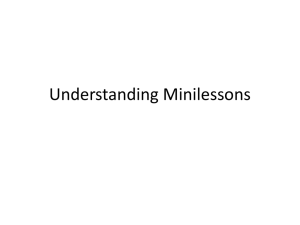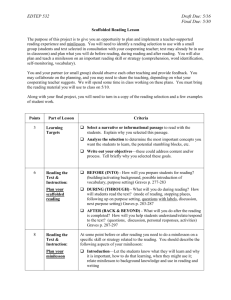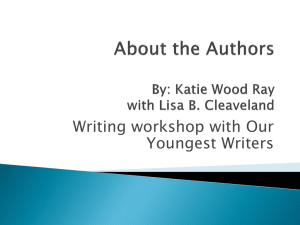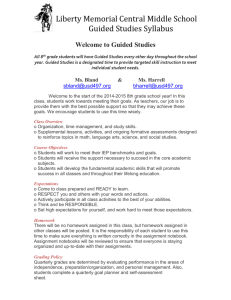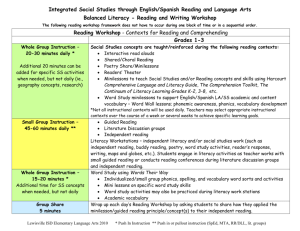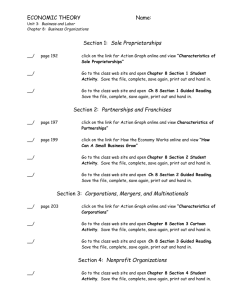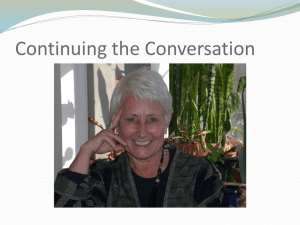Reading and Writing Workshop - Reading-Writing-Workshop
advertisement
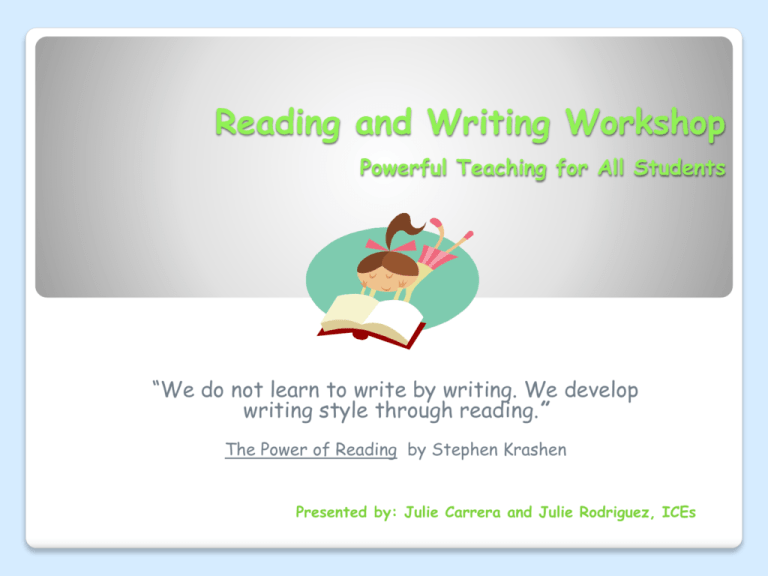
Reading and Writing Workshop Powerful Teaching for All Students “We do not learn to write by writing. We develop writing style through reading.” The Power of Reading by Stephen Krashen Presented by: Julie Carrera and Julie Rodriguez, ICEs Course Content & Goals Why balanced literacy? Understanding the Research Behind Best Practice Literacy Instruction Elements of a Daily Balanced Literacy Classroom Classroom Management in Reading and Writing Workshop Assessment and Planning to Improve Student Literacy Learning What goals do you have for yourself as a professional educator throughout this course? How will your learning through this course impact your students and their learning? Reading and Writing Connections Writer What do I want readers to know, think, consider, or decide? (ideas and content) Reader How is the author supporting me through this piece? What is the shape of the piece? “While reading andHow writing may be does the language help me understand what the author is taught separate, the connections (word choice) telling me and think more about what I already know? between the two parallel processes must bereader made How will I tell my when explicit.” to How do I know when to pause; when How will the words I use influence the message my reader gets? pauseFountas or when toand add their own Pinnell information? (conventions) to read quickly? How will I take my readers though my thinking? (organization) How is the author supporting me through this piece? Literacy Learning: Teachers as Professional Decision Makers © 2004 Richard C. Owens Publishers, Inc. Table Talk: Becoming a Lifelong Reader Learning to read in the fullest sense means developing decoding skills, but much more. It means becoming readers who: •Read voluntarily and often •Read a wide variety of materials. •Have confidence in themselves as readers. •Collect books and refer to favorites again and again. •Recommend books to others. •Reflect on their reading. •Make connections between and among the things they have read. •Think critically about what they read. Guiding Readers and Writers, Fountas and Pinnell Table Talk: Becoming Lifelong Writers Learning to write in the fullest sense means more than developing composing and spelling skills. It means becoming writers who: •Write voluntarily and often •Write in a wide variety of genres and audiences •Have confidence in themselves as writers. •Use writing as a tool for thinking. •Write to communicate, share experiences or information with others. •Invite comments on, responses to, and critiques of their writing. Guiding Readers and Writers, Fountas and Pinnell “Writing and Reading Workshop are perpetual- day in, year out.” ( Atwell 1985) Why balanced literacy? Understanding the Research Behind Best Practice Literacy Instruction Jigsaw and Table Talk Connecting Brian Cambourne’s Conditions of Learning Theory to Brain/Mind Principles: Implications for Early Childhood Educators Codes for Taking Notes √ Confirms what you thought X Contradicts what you thought ? Raises a question ?? Confuses you * Seems important ! Is new or interesting If a word Gets repeated Seems important Is Unknown Box it: word Gradual Release of Responsibility Student Participation Reading To Writing For Shared Guided Independent Teacher Support To With With By Diagram developed by Margaret Mooney “If reading is about mind journeys, teaching reading is about outfitting the travelers, modeling how to use the map, demonstrating the key and legend, supporting the travelers as they lose their way and take circuitous routes, until, ultimately, it’s the child and the map together and they are off on their own.” Keene, E. and Zimmerman S. 1997. Mosaic of Thought The Teaching & Learning Cycle Assessment LEARNING Teaching Evaluation Planning Essentials of Reading & Writing Workshop Reading Workshop Teacher Model- Read to Shared Reading Minilessons (researched based reading strategies) Guided Reading and Literature Circles Time to read independently and time to share Choice Reflection and Evaluation Environment and materials Reading Workshop (60 mins.) Minilesson/Read To Independent Reading Guided Reading Literature Study/ Book Clubs Sharing Writing Workshop Teacher Model- Write to Shared Writing Minilessons Teacher and peer conferences Time to write independently and share Literature based instruction Choice Records and self assessment Environment and materials Writing Workshop (60 mins.) Minilesson/Write To Status of the Class Independent Writing Conferring Sharing Read To & Write To: Teacher Modeling Teacher writes and/or reads, talks and thinks aloud while writing/reading Demonstration of what strong writers/readers “do” Students “look, listen & learn” May be whole group or small group “You should write too, under the same conditions – on the board or in your notebook– and share your writing first. It’s a matter of ethics. You are going to be seeing their work; it’s only fair that they see yours.” Donald Murray (1985) Essentials of Reading & Writing Workshop Reading Workshop Teacher Model- Read to Shared Reading Minilessons (researched based reading strategies) Guided Reading and Literature Circles Time to read independently and time to share Choice Reflection and Evaluation Environment and materials Reading Workshop (60 mins.) Minilesson/Read To Independent Reading Guided Reading Literature Study/ Book Clubs Sharing Writing Workshop Teacher Model- Write to Shared Writing Minilessons Teacher and peer conferences Time to write independently and share Literature based instruction Choice Records and self assessment Environment and materials Writing Workshop (60 mins.) Minilesson/Write To Status of the Class Independent Writing Conferring Sharing Return by 1:00 • Steak and Shake •TGI Friday’s •Chili’s •La Madeline •Mimi’s Café •Burger King •Rudy’s Essentials of Reading & Writing Workshop Reading Workshop Teacher Model- Read to Shared Reading Minilessons (researched based reading strategies) Guided Reading and Literature Circles Time to read independently and time to share Choice Reflection and Evaluation Environment and materials Reading Workshop (60 mins.) Minilesson/Read To Independent Reading Guided Reading Literature Study/ Book Clubs Sharing Writing Workshop Teacher Model- Write to Shared Writing Minilessons Teacher and peer conferences Time to write independently and share Literature based instruction Choice Records and self assessment Environment and materials Writing Workshop (60 mins.) Minilesson/Write To Status of the Class Independent Writing Conferring Sharing Mini-lessons •Teaching point is based on student need, data, TEKS/ARRC •Golden opportunities to teach skills in short, concentrated bursts •Connect writing •Short, these skills to the authentic reading and clear, concise! Use concrete examples. •Deciding What to Teach (reading page 137, writing page 66) 10 minute reflection of today’s learning… New thinking or Confirmed thinking One question What is rolling around in your head about reading and writing instruction? Essentials of Reading & Writing Workshop Reading Workshop Teacher Model- Read to Shared Reading Minilessons (researched based reading strategies) Guided Reading and Literature Circles Time to read independently and time to share Choice Reflection and Evaluation Environment and materials Reading Workshop (60 mins.) Minilesson/Read To Independent Reading Guided Reading Literature Study/ Book Clubs Sharing Writing Workshop Teacher Model- Write to Shared Writing Minilessons Teacher and peer conferences Time to write independently and share Literature based instruction Choice Records and self assessment Environment and materials Writing Workshop (60 mins.) Minilesson/Write To Status of the Class Independent Writing Conferring Sharing “The aim of guided reading is to develop independent readers who question, consider alternatives, and make informed choices as they seek meaning.” Margaret Mooney Guided Reading Study Group Choices Chapter Eleven- Understanding Guided Reading (one) Chapter Twelve- Planning for Guided Reading (two) Chapter Thirteen- Dynamic Grouping for Effective Teaching in Guided Reading The Teaching & Learning Cycle (three) Assessment LEARNING Teaching Evaluation Planning Responsive Teaching & Guided Reading Monitoring and Anecdotal Records DRA and Running Records Benchmark and other Assessment Data Learners’ Individual Needs in Guided Reading Guided Reading •Grade level Triads •Go to ARRC to find a focus for guided reading lesson •Plan using template in handouts •Other Considerations: Are there graphic organizers that fit with this lesson? Is there key vocabulary that needs to be extrapolated? Could you integrate science or social studies to one of your grade level TEKS using a leveled text? How was this planning activity different from planning a guided reading lesson for your students? Any New Thoughts or Shifts in Thinking? Word Study Read Word Study on page 33-35 Think Pair Share Word Matters by Fountas and Pinnell, Words Their Way by Bear, Invernizzi, Templeton, Johnston TEKS inform mini-lessons RRISD statement on spelling Essentials of Reading & Writing Workshop Reading Workshop Teacher Model- Read to Shared Reading Minilessons (researched based reading strategies) Guided Reading and Literature Circles Time to read independently and time to share Choice Reflection and Evaluation Environment and materials Reading Workshop (60 mins.) Minilesson/Read To Independent Reading Guided Reading Literature Study/ Book Clubs Sharing Writing Workshop Teacher Model- Write to Shared Writing Minilessons Teacher and peer conferences Time to write independently and share Literature based instruction Choice Records and self assessment Environment and materials Writing Workshop (60 mins.) Minilesson/Write To Status of the Class Independent Writing Conferring Sharing The Writing Process Prewriting – rehearsal or brainstorming – help students to find the purposes and audiences Writing the rough draft – concentrate on getting a “chunk” down on paper Revising – writer’s craft Editing – proofreading/writing mechanics Publishing – informal & formal Conferencing with teachers & peers throughout the writing cycle Learning About Process From Writers Study the ways in which authors use the writing process: • What makes a writer choose to begin a project? • What do writers do once they start moving toward a writing project? • How do authors draft? http://www.ralphfletcher.com/index.html Why is choice so important? “Let’s get right down to it: while the teacher may determine what gets taught, only the student can decide what will be learned.” Writing Workshop, Ralph Fletcher What is a writer’s notebook? It is… A place to store your thoughts, feelings, observations, ideas, opinions, and more A place to record your reactions “A writer’s notebook gives you a place to live like a writer, not just in school during writing time, but wherever you are, at any time of day.” Ralph Fletcher It is not… A diary Not a reading journal in which students write summaries, main ideas, or letters to characters per the teacher’s assignment From A Writer’s Notebook by Ralph Fletcher An excerpt from Ralph Fletcher’s Writer’s Notebook… “This morning I stopped to buy an iced coffee. When I got home I took out my writer's notebook, the most important tool I have. I think of my notebook as an "idea bank" or "seed farm" where I can collect ideas, or just write for fun. I opened my writer's notebook and jotted this down: I love an iced coffee, with milk and sugar, on a warm summer's morning. Light and sweet, that's what I tell the woman at the Dunkin' Donuts, and she knows what I mean. When I've got a cup of iced coffee in my hand, so cold beads of condensation are already gathering on the sides, and I'm getting double-jolted by the surge of caffeine plus the lift, provided by those sugar crystals crunching between my teeth, I know beyond doubt it's going to be a great summer day.” "Letters To Young Writers." Ralph Fletcher, Amy Krouse Rosenthal, and Caryn Mirriam-Goldberg (Sep. 2005) “The writer’s notebook nudges students to become more active learners. It gives them a place to react to their world. To make that all-important personal connection. And the notebook provides a safe place- no grades, no one correcting their grammar.” School Talk, Writer’s Notebook: A Place to Dream, Wonder, and Explore, Ralph Fletcher Essentials of Reading & Writing Workshop Reading Workshop Teacher Model- Read to Shared Reading Minilessons (researched based reading strategies) Guided Reading and Literature Circles Time to read independently and time to share Choice Reflection and Evaluation Environment and materials Reading Workshop (60 mins.) Minilesson/Read To Independent Reading Guided Reading Literature Study/ Book Clubs Sharing Writing Workshop Teacher Model- Write to Shared Writing Minilessons Teacher and peer conferences Time to write independently and share Literature based instruction Choice Records and self assessment Environment and materials Writing Workshop (60 mins.) Minilesson/Write To Status of the Class Independent Writing Conferring Sharing Teacher-Student Conferences • Listen—get to know the writer • Be positive—build on strengths • Focus on improving life-long writing skills • Focus on one teaching point (approximations) “...in a conference our job is to interact with students so that they can interact with their writing, not just for five minutes but for a lifetime.” Lucy Calkins (1991) Writing Conferences What is the teacher’s role in the conference? What is the student’s role in the conference? What learning took place for the writer? Essentials of Reading & Writing Workshop Reading Workshop Teacher Model- Read to Shared Reading Minilessons (researched based reading strategies) Guided Reading and Literature Circles Time to read independently and time to share Choice Reflection and Evaluation Environment and materials Reading Workshop (60 mins.) Minilesson/Read To Independent Reading Guided Reading Literature Study/ Book Clubs Sharing Writing Workshop Teacher Model- Write to Shared Writing Minilessons Teacher and peer conferences Time to write independently and share Literature based instruction Choice Records and self assessment Environment and materials Writing Workshop (60 mins.) Minilesson/Write To Status of the Class Independent Writing Conferring Sharing “Once we understand what great writers do we need to find ways of building classroom structures to contain that doing.” Randy Bomer Independent Reading & Writing Chapter Five- Developing Accomplished Writers: The Writing Workshop (Getting a Writing Workshop Started page 81) Chapter Seven- Encouraging Independent Reading (First 20 Days page. 142) Reader Response Chapter Ten: Writing to Explore Meaning: Reader’s Notebook Teaching Students to Write Quality Responses (page 180) Assessing Student Response (page 180) Qualities of a Reading Response chart (page 183) September 12, 2006 Dear Class, Yesterday I read You Are Special to Me by Max Lucado. The Wemmicks in this book give dots and stars to other Wemmicks depending on if they like or dislike one another. I feel bad for Punchinello, one of the Wemmicks, because he is getting a lot of dots from others because he is different, and I think he is getting picked on. By the way, dots are bad and mean others don’t like you. I bet the Wemmicks who get dots are sad. If it was me I would hate wearing the dots because a dot means I’m different in a bad way. Why does he continue wearing the dots? There is another important character in the book named Lucia and she is lucky! Dots or stars don’t stick to Lucia. She is unique and different from the others. As I was reading, I wondered why people gave her stickers if they knew they wouldn’t stick. I guess it was just a habit for Wemmicks. Later, I realized she didn’t let others make her feel bad or good because she knew in her heart that she was special. It didn’t bother Lucia when others didn’t like her and gave her dots. This is why the dots and stars didn’t stick. Finally, I had a text to text connection. This book reminds me of Pinocchio and Geppetto because Punchinello was made by a master too. His master, Eli, cared for him a lot just like Geppetto did for Pinocchio. Sincerely, Ms. Rodriguez Essentials of Reading & Writing Workshop Reading Workshop Teacher Model- Read to Shared Reading Minilessons (researched based reading strategies) Guided Reading and Literature Circles Time to read independently and time to share Choice Reflection and Evaluation Environment and materials Reading Workshop (60 mins.) Minilesson/Read To Independent Reading Guided Reading Word Study Literature Study/ Book Clubs Sharing Writing Workshop Teacher Model- Write to Shared Writing Minilessons Teacher and peer conferences Time to write independently and share Literature based instruction Choice Records and self assessment Environment and materials Writing Workshop (60 mins.) Minilesson/Write To Word Study Status of the Class Independent Writing Conferring Sharing Monitoring & Record Keeping Status of the class Conference Records (student, teacher) Teacher Rove – anecdotal notes Lesson plans Strategies for avoiding interruptions: ◦ Help circles/ Question Mark ◦ Nonverbal communication Classroom Management Chapter Six- Making It Work: Organizing and Managing Time, Space, and Resources ◦ ◦ ◦ ◦ ◦ ◦ ◦ Building a Classroom Community Physical Environment Social Environment Managing Time Records of Reading and Writing Making and Enforcing Rules that Work Teaching Students to Care Final Thoughts on Reading and Writing Workshop Students should: Read and write daily for extended periods of time Learn to write from writers Experience CHOICE & OWNERSHIP Teachers should: Model, model, model!!! Teach minil-esson/skill lessons that are short, sweet, and focused on what students need Regularly give students feedback on their writing Provide reading and writing instruction based on individual needs, assessments, and strengths Fall Cohort Meeting Dates… November 5- full day December 11- after school January 22- after school Julie Rodriguez, julieerrin_rodriguez@roundrockisd.org Julie Carrera, julie_carrera@roundrockisd.org
